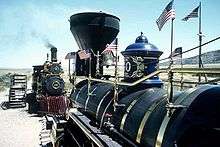Golden Spike National Historic Site
| Golden Spike National Historic Site | |
|---|---|
|
IUCN category V (protected landscape/seascape) | |
 | |
| Location | Box Elder County, Utah, USA |
| Nearest city | Brigham City, UT |
| Coordinates | 41°37′04″N 112°33′06″W / 41.6179°N 112.5516°WCoordinates: 41°37′04″N 112°33′06″W / 41.6179°N 112.5516°W[1] |
| Area | 2,735 acres (1,107 ha) |
| Established | April 2, 1957 |
| Visitors | 40,156 (in 2005) |
| Governing body | National Park Service |
| Website | Golden Spike National Historic Site |
Golden Spike National Historic Site is a U.S. National Historic Site located at Promontory Summit, north of the Great Salt Lake in Utah. The nearest city is Brigham City, approximately 32 miles (51 km) east-southeast of the site.
It commemorates the completion of the first Transcontinental Railroad where the Central Pacific Railroad and the Union Pacific Railroad met on May 10, 1869.[2] The final joining of the rails spanning the continent was signified by the driving of the ceremonial Golden Spike.
Background

The Golden Spike National Historic Site encompasses 2,735 acres (1,107 ha). In 2002, it received 49,950 visitors. It was authorized as a National Historic Site on April 2, 1957 under non-federal ownership. It was authorized for federal ownership and administration by an act of Congress on July 30, 1965.
In 1978, a general master plan for the site was adopted with the goal of maintaining the site's scenic attributes as closely as possible to its appearance and characteristics in 1869.
In 2006, a petition to the Board on Geographic Names resulted in a name change for Chinamans Arch, a 20-foot (6.1 m) limestone arch at Golden Spike NHS. Named Chinaman's Arch in honor of the 19th century Chinese railroad workers, the arch has now been officially renamed as the Chinese Arch to mollify sensitivities about the original name (which remains a common usage).
In 2015, a Lego model depicting the two steam locomotives at the Golden Spike National Historic Site was submitted to the Lego Ideas website.[3][4]
See also
- Jupiter (locomotive)
- Union Pacific No. 119
- List of heritage railroads in the United States
- List of transport museums
- Promontory, Utah
- Rail transport in Walt Disney Parks and Resorts
References
- ↑ "Golden Spike National Historic Site". Geographic Names Information System. United States Geological Survey. Retrieved 2008-11-21.
- ↑ "Ceremony at "Wedding of the Rails," May 10, 1869 at Promontory Point, Utah". World Digital Library. 1869-05-10. Retrieved 2013-07-20.
- ↑ Lego Ideas - Golden Spike Ceremony
- ↑ Salt Lake Tribune - How this Utah monument could become a new Lego set
External links
![]() Media related to Golden Spike National Historic Site at Wikimedia Commons
Media related to Golden Spike National Historic Site at Wikimedia Commons
- "Golden Spike National Historic Site". National Park Service. Retrieved 2008-11-21.
- ThemeTrains.com - The Golden Spike Centennial Limited
- Historic American Buildings Survey (HABS) No. UT-130-A, "Golden Spike, Visitor Center, State or County Road 504, Brigham City, Box Elder County, UT", 2 photos, 1 photo caption page
- HABS No. UT-130-B, "Golden Spike, Monument, State or County Road 504, Brigham City, Box Elder County, UT", 2 photos, 1 photo caption page
- Historic American Engineering Record (HAER) No. UT-64-H, "Promontory Route Railroad Trestles, S.P. Trestle 779.91, One mile southwest of junction of State Highway 83 and Blue Creek, Corinne, Box Elder County, UT", 32 photos, 12 measured drawings, 2 photo caption pages